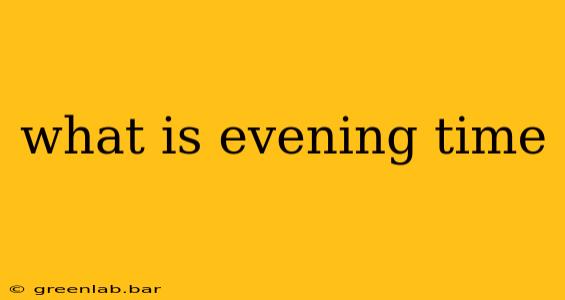Evening time, also known as the evening, is the period of time between the end of the afternoon and the beginning of the night. While there's no single, universally defined time that marks the start of the evening, it's generally understood to be the later part of the day, after the sun has begun to set. The exact time it begins, however, is subjective and varies based on several factors.
Factors Affecting the Perception of Evening Time
Several elements influence when people perceive the evening to begin:
1. Sunset: A Natural Marker
The most significant factor is the time of sunset. As the sun dips below the horizon, the natural light fades, signaling a transition to the cooler, darker hours. In many cultures, sunset acts as a natural boundary, marking the end of the day's activities and the start of evening relaxation. However, sunset times change dramatically depending on the season and geographical location.
2. Cultural and Social Norms:
Different cultures and societies have varying customs and routines that influence the perception of evening time. Some cultures emphasize communal activities during the evening, while others prioritize individual rest and relaxation. Social events, such as dinner parties or gatherings, often define evening activities, making the start time fluid and context-dependent.
3. Personal Schedules and Routines:
Individual routines play a crucial role. For some, evening might begin after work or school, while for others, it starts after completing household chores or personal responsibilities. The evening's start time is deeply intertwined with personal schedules and lifestyle.
4. Artificial Light: Blurring the Lines
Artificial lighting has significantly blurred the lines between day and night. The availability of electric lights extends human activities well into the hours of darkness, making the transition from afternoon to evening less defined than it once was. The use of artificial light can push the perceived start of evening later into the night.
Evening Time: More Than Just a Time Period
Evening time signifies more than a specific time; it represents a transition and a change in atmosphere. It's often associated with:
- Relaxation and unwinding: The evening provides a time to de-stress from the day's events and prepare for rest.
- Social interaction: Evenings are often reserved for family time, socializing with friends, or attending cultural events.
- Personal pursuits: The evening provides time for hobbies, reading, or other self-enriching activities.
- Preparation for sleep: The evening is a crucial time for winding down and preparing the body for sleep.
Conclusion: A Subjective and Shifting Boundary
In conclusion, evening time is a fluid and subjective period of the day, dictated by sunset, cultural norms, personal routines, and the influence of artificial lighting. It's not a fixed point on a clock but rather a transitionary period signifying the end of the day and the beginning of a period for rest, relaxation, and social interaction. Understanding these influences helps clarify what "evening time" means in different contexts.

